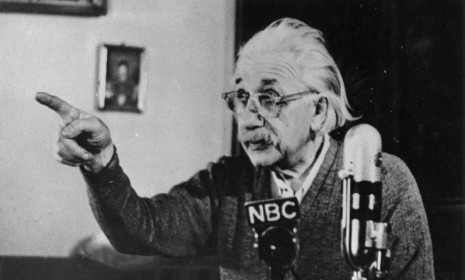Uncovered: Physical evidence proving Albert Einstein's brain was superior to yours
Recently rediscovered photographs of the late genius' brain reveal a few extraordinary physical differences

A free daily email with the biggest news stories of the day – and the best features from TheWeek.com
You are now subscribed
Your newsletter sign-up was successful
His brain is legendary: When TIME named Albert Einstein its Person of the Century in 1999, the magazine called the shaggy-haired physicist a "genius among geniuses," whose understanding of the universe represented the "embodiment of pure intellect."
What few people know, however, is that within a few hours of his death in 1955, Einstein's brain was removed from his skull and photographed from different angles before it was sectioned into 240 blocks — all to advance the sciences he loved so dearly. Many of the photographs, however, were lost or misplaced over the decades. Now analysis of 14 recently resurfaced photos reveals what we've suspected all along: Einstein's physical brain, says Doyle Rice at USA Today, "was better than yours." Though not at first glance.
According to the study from Florida State University, the pre-dissected brain doesn't initially appear all that different from the average person's. "Although the overall size and asymmetrical shape of Einstein's brain was normal," writes study author Dean Falk, an evolutionary anthropologist from Florida State University, "the prefrontal, somatosensory, primary motor, parietal, temporal, and occipital cortices were extraordinary."
The Week
Escape your echo chamber. Get the facts behind the news, plus analysis from multiple perspectives.

Sign up for The Week's Free Newsletters
From our morning news briefing to a weekly Good News Newsletter, get the best of The Week delivered directly to your inbox.
From our morning news briefing to a weekly Good News Newsletter, get the best of The Week delivered directly to your inbox.
The prefrontal cortex is the part of the brain in charge of abstract thinking and thought analysis — responsible for digesting sensory data before making any decisions. As such, it's also the most "strongly implicated" as a sign of intelligence. Analysis of these photographs revealed that Einstein's prefrontal cortex is more complex and possessed a far greater surface area than most people's, which may explain some of his "remarkable cognitive abilities," said Falk.
Sources: TIME, TG Daily, USA Today, WiseGeek
A free daily email with the biggest news stories of the day – and the best features from TheWeek.com
-
 How the FCC’s ‘equal time’ rule works
How the FCC’s ‘equal time’ rule worksIn the Spotlight The law is at the heart of the Colbert-CBS conflict
-
 What is the endgame in the DHS shutdown?
What is the endgame in the DHS shutdown?Today’s Big Question Democrats want to rein in ICE’s immigration crackdown
-
 ‘Poor time management isn’t just an inconvenience’
‘Poor time management isn’t just an inconvenience’Instant Opinion Opinion, comment and editorials of the day